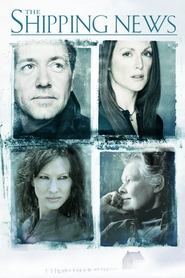This is one of those film adaptations of well-loved novels where it hits all of the major plot points, characters and snatches of dialogue but primarily in service of subliminally prompting the viewer to repeatedly recall, "Oh, I remember loving that bit in the novel" and tries not to screw it up too much with bad accents and child actors to vocalise the adult's feelings. Alas… (etc. etc.)
More seriously, though, the drawback of this passive approach to adaptation is that it ultimately plays it far too safe, makes for a distant viewing sensation if you disconnect it from its original book and it ultimately does not appreciate (or care to understand) the differences between the two artforms.
One of The Shipping News' extra difficulties however, is offering a distinctly average (if not under-average…) everyman as the audience surrogate character without him coming across as, at best, problematic. This is not a unique difficulty, for it wasn't easy to watch in Being There (1979), Rain Man (1988) or Forrest Gump (1994). But it isn't easy to watch Kevin Spacey (of all people), do a pretty amateurish impression of nice-but-kinda-slow-and-sympathetic "lumbering idiot" who doesn't quite understand that he has sexually assaulted Wavey Prowse.
Another of the film's difficulties is in depicting Newfoundland without falling into the worst (and most boring) kind of kitsch. Annie Proulx's intelligent and vaguely cubist engagement with the specific folksiness of the island's geography and politics reads as distinctly one-dimension here, with a complicated culture reduced to hokey 'eire-yurish' soundtracks replete with harps and tin whistles, folklore being depicted as being sincerely believed by cartoonishly tramp-like locals and multiple hackneyed flashbacks to scenes of snow and water.
This film wasn't disappointing per se, as this is all exactly what I was expecting in an early-2000s Miramax literary adaptation. No doubt Harvey Weinstein's fingers were all over the decision to foreground the 'love' story and to Spielbergise the rest into mush; I just hope Annie Proulx took every penny she could from him along the way. Oh yeah, the surprise resurrection in was done better in Ordet.
[Director] Mr. Hallstrom brings to the project his ever-likable hallmarks: an unfailingly warm-hearted humanism, a special affinity for children, and his soft-edged cinematic lyricism with a visionary edge. But try as he might, he can find no visual images to correspond to the tone and flavor of Ms. Proulx's idiosyncratic language. What he has made of the book is a sweet and salty tone poem: a seamlessly woven, handsomely illustrated digest of the novel's characters and incidents, tricked out with hallucinatory flashbacks. On the screen personal horror stories that leap off the page melt into folksy yarns that the movie meticulously strings together without their adding up to much, despite the deployment of visual leitmotifs. The final product is soft at the center, a rustic cinematic greeting card.[…]
Instead of giving you the book, it leaves you with the unfulfilled sense of having leafed through an elegant, studiously captioned photo essay of the same material.
— Stephen Holden (New York Times)

